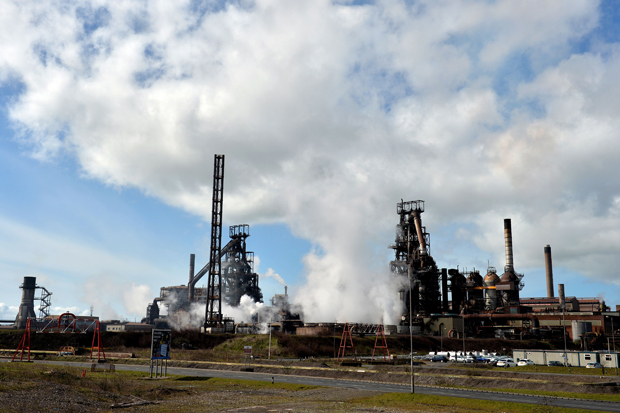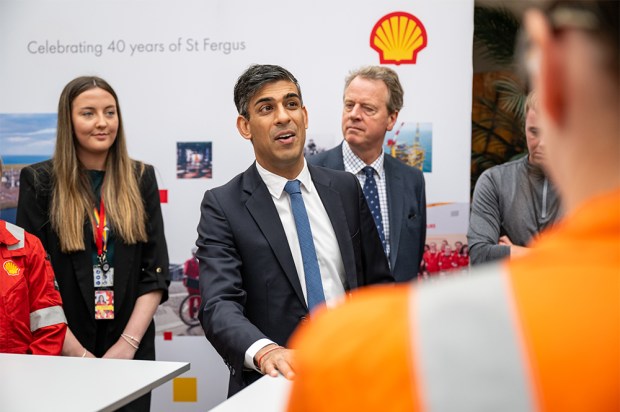A fortnight ago, the energy minister, Andrea Leadsom, declared grandly that Britain, alone in the world, would commit to a target of reducing net carbon emissions to zero. ‘The question is not whether but how we do it,’ she told Parliament. It is now becoming painfully clear how this target will be reached: not by eliminating our carbon emissions but by exporting them, along with thousands of jobs and much of our manufacturing industry.
This week, Tata Steel announced that its entire UK business is to be put up for sale. That came after Stephen Kinnock, whose South Wales constituency includes Tata’s giant plant at Port Talbot, joined a union delegation to the headquarters of Tata Steel in India to beg the company to keep the plant open. Some 750 job losses have already been announced there; more than 1,000 jobs, including these, will be lost across Britain as our steel industry struggles to compete with lower-cost producers overseas.
David Cameron’s government said it would consider support — which is ironic, given its role in Tata’s problems. Yes, steel prices have collapsed worldwide — but the other factor that Tata has mentioned is energy costs. Britain has the highest energy costs in Europe, thanks to decisions taken not in Brussels but in Whitehall. Crusaders like Ms Leadsom have, over the years, made sure that our manufacturers feel the force of green levies, unlike Germany, which exempts its own industry. The idea is that by making energy more expensive, people are encouraged to use less of it. This is working very effectively, as the soon-to-be-unemployed Welsh steelworkers will attest. If the plant closes, carbon emissions in Port Talbot will fall dramatically.
Mr Kinnock has been a staunch defender of the plant, as one might expect, given its importance to many of the voters who elected him. But he can’t bring himself to admit that crippling energy prices, caused by taxes and levies designed to help Britain meet its self-imposed and unilateral carbon-reduction targets, have worsened Tata’s problems in Britain.
Addressing Parliament in February, Mr Kinnock hardly mentioned energy costs at all, demanding instead that the government try to save the plant by imposing tariffs on steel imported from China. It has become received wisdom — especially among sections of the Eurosceptic right — that the Chinese are out to ruin our steel industry by ‘dumping’ steel on our market and there’s nothing we can do about it because of EU rules. While it’s true that the EU has control of trade tariffs, it does more than its fair share of slapping tariffs on Chinese goods, often to the detriment of consumers.
All European producers face much higher costs than Chinese steelmakers thanks to the EU Emissions Trading System. But Britain imposes its own green taxes on top of this in the form of the Carbon Price Floor and the Renewables Obligation — an epic act of self-harm. Tata points out that its energy costs for running steel plants in Britain are 25 per cent more than they would be in Germany and 50 per cent more than they would be in France. This is due to decisions by the UK government to spread the pain of green tariffs so that businesses are hit as hard as consumers.
Five years ago, when George Osborne was still promising to rebalance the economy and championing his ‘march of the makers’, he seemed to appreciate the danger that green levies posed to steel and other important British industries. In his autumn statement of that year, he announced his intention to introduce a tax rebate for energy intensive industries to compensate them for high-energy costs. It was to be introduced in 2013 and would be worth £250 million.
Yet industry is still waiting for the money. The proposal, it turned out, conflicted with EU rules about state aid and required approval. The haggling over this finished only recently.
There is, of course, a better way to reduce energy costs for industry and it wouldn’t involve having to grovel to Brussels to get permission. Moreover, it would help all industries, not just the ones that are big enough to satisfy the arbitrary definition of an ‘energy-intensive industry’. It is to reduce carbon taxes and levies for everyone.
Desirable though it is to reduce carbon emissions, there is no point in committing Britain to stringent carbon-reduction targets if other countries do not do the same. But this hasn’t yet dawned on the government, nor on the main opposition parties. Our policies have a minimal effect on global warming but a profound effect on communities such as Port Talbot — not to mention the households of those in fuel poverty. Raising fuel bills has a real human cost. The ONS recorded 40,000 excess winter deaths in 2014/15, in many of which inadequately-heated homes will have been a factor. Yet it seems that was not enough to start a debate about the cost of fuel bills.
If manufacturing simply transfers abroad, that won’t do a thing to reduce global carbon emissions. It is pure industrial suicide. David Cameron’s government is now considering what it can do to help the steelworks. He ought to have thought it all through more carefully before signing up to Ed Miliband’s Climate Change Act. The prospects for British factories will improve when we stop blaming the Chinese for being so competitive and realise that the problem lies not in Beijing, but at the Treasury and the Department for Energy and Climate Change.
Got something to add? Join the discussion and comment below.
Get 10 issues for just $10
Subscribe to The Spectator Australia today for the next 10 magazine issues, plus full online access, for just $10.
You might disagree with half of it, but you’ll enjoy reading all of it. Try your first month for free, then just $2 a week for the remainder of your first year.














Comments
Don't miss out
Join the conversation with other Spectator Australia readers. Subscribe to leave a comment.
SUBSCRIBEAlready a subscriber? Log in